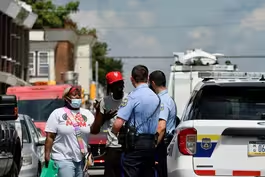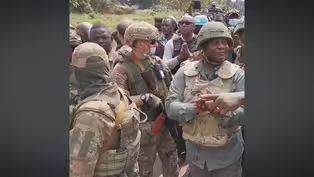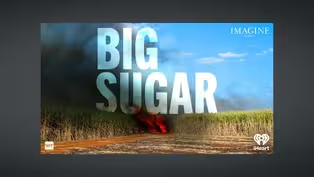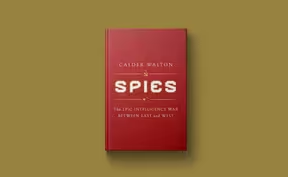
How the American Revolution became a political tool
Clip: 7/4/2023 | 8m 5sVideo has Closed Captions
How the American Revolution has become part of the current political divide
The American Revolution and the founding founders are two parts of U.S. history celebrated on July 4. But two centuries later, 1776 was a rallying cry for rioters disrupting a national election at the Capitol. It's an example of how the politics and rhetoric around the founding have become ideological tools and can eclipse the actual history involved. Lisa Desjardins reports.
Problems playing video? | Closed Captioning Feedback
Problems playing video? | Closed Captioning Feedback
Major corporate funding for the PBS News Hour is provided by BDO, BNSF, Consumer Cellular, American Cruise Lines, and Raymond James. Funding for the PBS NewsHour Weekend is provided by...

How the American Revolution became a political tool
Clip: 7/4/2023 | 8m 5sVideo has Closed Captions
The American Revolution and the founding founders are two parts of U.S. history celebrated on July 4. But two centuries later, 1776 was a rallying cry for rioters disrupting a national election at the Capitol. It's an example of how the politics and rhetoric around the founding have become ideological tools and can eclipse the actual history involved. Lisa Desjardins reports.
Problems playing video? | Closed Captioning Feedback
How to Watch PBS News Hour
PBS News Hour is available to stream on pbs.org and the free PBS App, available on iPhone, Apple TV, Android TV, Android smartphones, Amazon Fire TV, Amazon Fire Tablet, Roku, Samsung Smart TV, and Vizio.
Providing Support for PBS.org
Learn Moreabout PBS online sponsorshipAMNA NAWAZ: The American Revolution and the founding founders, two parts of U.S. history celebrated on July Fourth.
In recent years, they have also become political and ideological tools, including at times of some extremist groups on the right.
Lisa Desjardins has more.
LISA DESJARDINS: 1776 is a symbol of freedom, reason, and the founding of this country.
But two centuries later, that date, 1776, was a rallying cry for rioters disrupting a national election at the Capitol.
PROTESTERS: 1776!
1776!
RIOTERS: 1776!
1776!
RIOTERS: 1776!
LISA DESJARDINS: It is an example of how the politics and rhetoric around the founding has become inflamed and can eclipse the actual history involved.
Joining me to discuss are Amy Cooter, the research director at the Center on Terrorism, Extremism, and Counterterrorism at the Middlebury Institute, and Jim Grossman, historian and executive director of the American Historical Association.
Amy, I want to start with you.
July Fourth celebrates our history of men who were radical in their time in the founding, but I want to talk about the group you study now, those were in militias, those who are extremists.
How do they use 1776 for their own purposes?
AMY COOTER, Senior Research Fellow, Middlebury Institute: For them, 1776 has been important for longer than important for much longer than what we just saw with January 6.
For them, it is kind of their reason to be in the militia, their reason to be as a man in society.
They really see themselves as acting in the lineage of the founding fathers and think that true patriots have this obligation to honor them and honor that date.
LISA DESJARDINS: Jim, I want to talk also more broadly about the political bloodstream, because talking about the founding fathers is political boilerplate, but especially in recent times for conservatives.
And I want to play this video.
This is South Carolina, Tim Scott, presidential candidate and Republican, his July Fourth message out this year.
SEN. TIM SCOTT (R-SC), Presidential Candidate: Our founding fathers were geniuses who should be celebrated, not canceled.
LISA DESJARDINS: Obviously, there was genius involved in the founding of America.
But I wonder how you see the positives and negatives versus the rhetoric which is sort of amped up about the founding fathers.
JIM GROSSMAN, Executive Director, American Historical Association: The problem here is an inclination among many people to see things as black and white, to see things as just, it's either this or it's that.
And people talk about teaching the glory and the glory, for example, of American history.
Senator Scott says they should be celebrated and not canceled.
They shouldn't be understood.
And that doesn't mean celebrated.
It doesn't mean canceled.
Their ideas were brilliant.
There is no question that the founding documents were, in fact, revolutionary.
They contained insights into liberty, into freedom.
But these men also -- they were men.
There weren't any women present.
These men also were mostly men who owned, bought and sold other human beings.
And they lived and had grown up in a world where it was OK to own, buy, and sell other human beings.
And to understand what they wrote and to understand them, we have to understand that.
This is not a theory.
This is a fact.
LISA DESJARDINS: Amy, one thing we're talking about here is patriotism that could morph into nationalism.
Can you talk about those two ideas and what happens there?
AMY COOTER: Right.
So, social scientists distinguish between patriotism as being a love for one's country, versus nationalism, which basically is this negative comparison to everywhere else.
It's not just, I love my country, but it's better than everywhere else.
Everywhere else is bad, in a sense.
And patriotism in the militia world and beyond kind of appeals to our founding and paints us as this proverbial city on a hill, without looking, as Jim said, at some of the negatives that go along with the positives.
LISA DESJARDINS: Jim, I'm wondering, why do you think this is bubbling up now, this sort of particular -- and, of course, it's not unique in American history to be having this divide.
But why are we seeing this sort of form of it now?
What in the last 50 years could have led to this?
JIM GROSSMAN: We're seeing this now because -- and 50 -- 60 years is about right -- because, during the 1960s, things changed in ways that upset many Americans.
Between the 1965 immigration changes, changes in immigration law, feminism of the 1960s, and the Civil Rights Act and Voting Rights Act and civil rights activism, for many Americans,this is not the country that they thought it was or that it should be,because women are not acting the way their wives and daughters and mothers acted a generation before the 1960s, African Americans asserting rights that, quite frankly, were not granted to them before the 19 -- before the 1950s and '60s, and the opening of the doors to millions of immigrants since 1965.
This is not the country that we were.
So I think it goes back to the '60s as to what has changed.
LISA DESJARDINS: Amy, I want to -- I saw you nodding during some of that How do race and identity, in particular, factor in with what you're seeing with militia groups and extremists?
AMY COOTER: With most militia groups I have studied, they are not overtly racist at the group level, in the sense of being white supremacists, being the same as neo-Nazis.
That's just not what we see with this particular movement.
But just like many other white Americans who aren't part of militias, they have received a partial view of history through their educational process.
They have not learned about slavery.
They have not learned about Native American genocide, and they have not learned why those things still impact people very differently today.
And so when we have conversations about Critical Race Theory or about transgender rights, it's really easy for those things to become kind of buzzwords that are dismissed without much in-depth investigation into what they really mean and some of the concepts behind them.
It's all too easy to use that as sort of an excuse to fight back against what they see as too rapid social progress, but package it in a way that at least comes across as appealing to a broader swathe of America.
LISA DESJARDINS: Jim, as we're wrapping up, I want to focus on a survey that your group did looking at how Americans learn history.
They told you that they see history as facts, what, where, when, versus historians, who think of it as a conversation, looking at primary documents, and that Americans mostly get their history from sources of entertainment.
What does that tell you about how we understand our history?
JIM GROSSMAN: I think it tells you that historians have some work to do, that we have to do a much better job of connecting with the American people.
And, in fact, this is one reason why the American Historical Association has recently issued guidelines suggesting to colleges and universities that more professional credit go to historians who are writing and speaking to the general public, rather than just to one another.
So I do think that those surveys do suggest that we, as historians, have a lot of work to do.
We do have to help Americans understand that facts are not very useful unless we know how to ask the right questions about them.
LISA DESJARDINS: Well, I think this conversation was very useful.
So, Jim Grossman, Amy Cooter, thank you to you both for a complex conversation, and happy Fourth of July.
AMY COOTER: You too.
JIM GROSSMAN: Thank you.
A Brief But Spectacular take on knowing your power
Video has Closed Captions
Clip: 7/4/2023 | 3m 44s | A Brief But Spectacular take on knowing your power (3m 44s)
Drug shortages make treatment decisions difficult
Video has Closed Captions
Clip: 7/4/2023 | 5m 53s | Prescription drug shortages make treatment decisions difficult for doctors and patients (5m 53s)
Fourth of July celebrations marred by mass shootings
Video has Closed Captions
Clip: 7/4/2023 | 2m 16s | Fourth of July celebrations marred by mass shootings in several U.S. cities (2m 16s)
A look at the Wagner Group's activities in Africa
Video has Closed Captions
Clip: 7/4/2023 | 6m 46s | A look at the Wagner Group's presence and activities in Africa (6m 46s)
Many current U.S. leaders have slaveholding ancestors
Video has Closed Captions
Clip: 7/4/2023 | 7m 50s | Report reveals many current U.S. leaders have slaveholding ancestors (7m 50s)
Podcast explores sugar industry's mistreatment of workers
Video has Closed Captions
Clip: 7/4/2023 | 6m 1s | New podcast examines sugar industry's political power and mistreatment of workers (6m 1s)
"Spies" chronicles war of espionage between U.S. and Russia
Video has Closed Captions
Clip: 7/4/2023 | 7m 10s | New book "Spies" chronicles war of espionage between U.S. and Russia (7m 10s)
Providing Support for PBS.org
Learn Moreabout PBS online sponsorship
- News and Public Affairs

FRONTLINE is investigative journalism that questions, explains and changes our world.

- News and Public Affairs

Amanpour and Company features conversations with leaders and decision makers.












Support for PBS provided by:
Major corporate funding for the PBS News Hour is provided by BDO, BNSF, Consumer Cellular, American Cruise Lines, and Raymond James. Funding for the PBS NewsHour Weekend is provided by...






